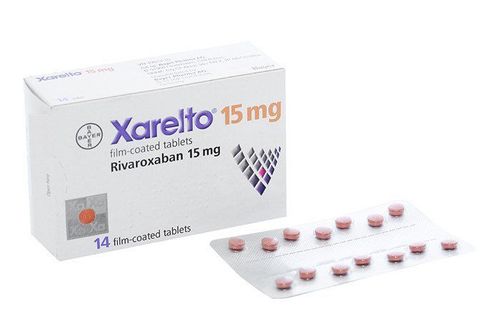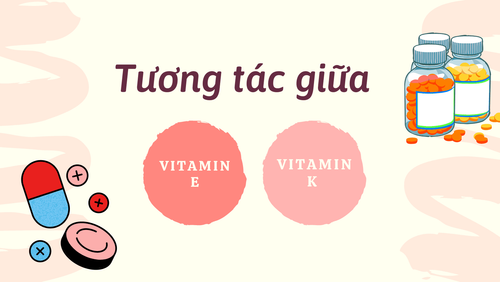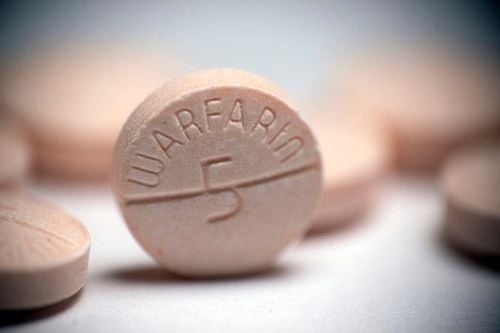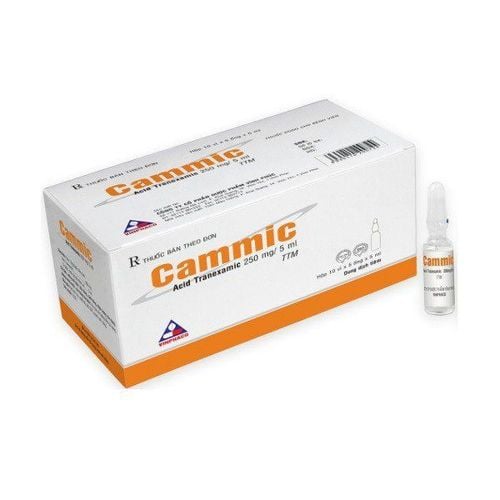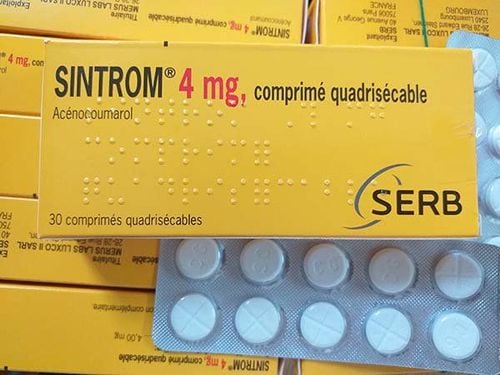This is an automatically translated article.
Sintrom is an anticoagulant used in the treatment of many different diseases. So what is the effect of Sintrom and how is it used?
1. What are the effects of Sintrom?
Sintrom belongs to the group of anticoagulants, antiplatelet and fibrinolytic drugs. The main ingredient of Sintrom is Acenocoumarol, which is a vitamin K antagonist. Vitamin K is a component for the synthesis of important blood clotting factors in the body. The reduced form of vitamin K is a cofactor of a Carboxylase used to convert Glutamic Acid to Gamma - Carboxyglutamic Acid. Four coagulation factors II, VII, IX, X and two inhibitors (Protein C and S) contain the necessary Gamma Carboxyglutamate groups that attach to Phospholipid surfaces to catalyze their interactions. Therefore, Acenocoumarol has an anticoagulant effect through inhibiting the formation of active forms of clotting factors. Specifically, Acenocoumarol inhibits the formation of clotting factors through interfering with the reduction mechanism of vitamin K in the liver.
Sintrom drug is indicated in the following cases:
Heart disease causing embolism: Sintrom is used to prevent thromboembolic complications due to atrial fibrillation, mitral valve disease, prosthetic valve users. Myocardial infarction: Sintrom prevents thromboembolic complications in myocardial infarction complications such as severe left ventricular dysfunction, supracardial thrombus, and embolic left ventricular dysrhythmias when continued therapy as an alternative to heparin. . Sintrom is used to prevent recurrence of myocardial infarction when aspirin cannot be used. Treatment of deep vein thrombosis, pulmonary embolism and use to prevent recurrence when continuing to replace heparin. Sintrom is also used to prevent venous thrombosis and pulmonary embolism in hip surgery. Prophylaxis of intracatheter thrombosis. Dosage of Sintrom 1mg to 10mg each time as prescribed by the doctor, 1 time per day. Take Sintrom with filtered or cooled boiled water.
Should take Sintrom at a certain time of the day. Each person's Sintrom doses are determined by their doctor's blood clotting time through routine INR testing. Patients need to comply with the dose and time of INR testing as ordered by the doctor. Avoid using too much, which can cause bleeding, or using too low a dose, which can cause blood clots.

Thuốc Sintrom được chỉ định trong các trường hợp bệnh tim gây tắc mạch
2. Contraindications of Sintrom
Do not use Sintrom for cases of hypersensitivity to any of its ingredients. Sintrom is contraindicated in patients with severe liver failure, those at risk of bleeding, those who have recently undergone neurosurgery and eye surgery or are likely to need a repeat operation.
Do not use Sintrom for people who have had a cerebrovascular accident (except in cases of thrombosis elsewhere). Patients with severe renal impairment (creatinine clearance < 20ml/min) should also not use Sintrom. People with esophageal varices, gastric - duodenal ulcers are progressing. Do not use Sintrom for pregnant women.
3. Side effects and interactions of Sintrom
Common side effects when using Sintrom include: Anorexia, nausea and vomiting, diarrhea, unexplained decrease in hematocrit, skin necrosis, liver dysfunction.
While using Sintrom, you should not combine with high-dose aspirin, non-steroidal anti-inflammatory drugs (NSAIDs) and drugs in the drug class: chloramphenicol, phenylbutazone, diflunisal.
Sintrom is an anticoagulant used in the treatment of many different diseases. To ensure effectiveness and avoid side effects, patients need to take the drug as prescribed or under the direction of a doctor or pharmacist.
Follow Vinmec International General Hospital website to get more health, nutrition and beauty information to protect the health of yourself and your loved ones in your family.
Please dial HOTLINE for more information or register for an appointment HERE. Download MyVinmec app to make appointments faster and to manage your bookings easily.





